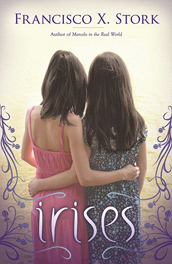 Girl Meets Boy: Because There Are Two Sides to Every Story; edited by Kelly Milner Halls, featuring stories by Chris Crutcher, Kelly Milner Halls, Jospeh Bruchac, Cynthia Leitich Smith, James Howe, Ellen Wittlinger, Rita Williams-Garcoa. Terry Trueman, Terry Davis, Rebecca Fjelland Davis, Sara Ryan & Randy Powell (ARC version) 2012
Girl Meets Boy: Because There Are Two Sides to Every Story; edited by Kelly Milner Halls, featuring stories by Chris Crutcher, Kelly Milner Halls, Jospeh Bruchac, Cynthia Leitich Smith, James Howe, Ellen Wittlinger, Rita Williams-Garcoa. Terry Trueman, Terry Davis, Rebecca Fjelland Davis, Sara Ryan & Randy Powell (ARC version) 2012Chronicle Books
Rating: 2.5/5
IQ "I know this shouldn't be anything, shouldn't matter, but for some reason it does matter to me; Raffina is black, and I'm white. Of course, she's not really black any more than I'm really white. She's kind of dark brown, no, kind of medium brownish. I'm definitely sort of beige or something, light beige, tinted pink or red depending on how much time I spend in the sun (I don't tan, I just burn). Maybe a better way to put this is that Raffina's ancestors came from Africa, and my ancestors came from....I don't know....not Africa. Someplace like England or Germany or Canada or something." Sean + Raffina, Sean pg. 117 (Trueman)
Twelve authors, 6 stories, straight and gay relationships. One author tells the story from the guy's point of view, the other tells the story from the girl's point of view. I picked the quote I did because it made me laugh in its simplicity and truth.
I did really enjoy the story 'Love or Something Like It' (its Chris Crutcher, who I love) and its complementary story, 'Some Things Never Change' (Halls) because they really took stereotypes and turned them on its head with the jock and the 'slut'. I felt Cynthia Leitich Smith and Joseph Bruchac did a good job of actually linking up their stories in 'Falling Down to see the Moon' (Bruchac) and 'Mooning Over Broken Stars' (Smith). And 'Launchpad to Neptune' (Sara Ryan & Randy Powell) is absolutely fascinating, it actually had a plot twist that I did not see coming and had well developed characters besides the main ones. There are points in each story that are relatable and while each story has one major issue and its all rather straightforward, they are stories that need to be told especially for those who need to get over their own prejudices. Books like these might help gently prod them to rethink their antipathy to dating someone outside their race, or to disapprove of those who are gay or lesbian or to judge people based on the number of people they may or may not have slept with.
Girl Meets Boy contains a collection of short and sweet stories from some of the best talents in the YA world and while I think these stories might have been more memorable if they were longer/a book of their own, better to have a little of the story than none at all. The stories can be heavy-handed at times and the supporting characters fell flat (and the cover's weird) but they are interesting. I also loved the last bit at the end where each of the authors (except Rita Williams Garcia, who I really wanted to hear from) shared their inspiration for their respective story. This book is a quick read that will pass the time but it most likely won't stay with you, read it at the beach or in a park.
Disclosure: This is embarrassing but I don't remember.....I think I got it from the publisher. Whoever it was, thank you!
















